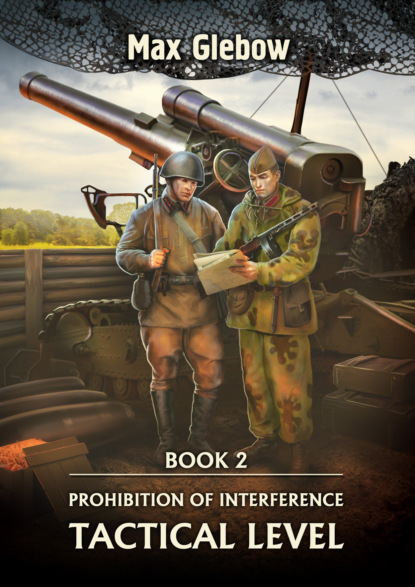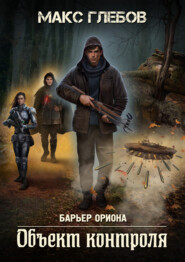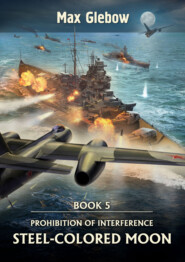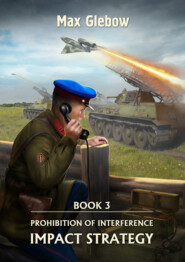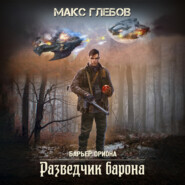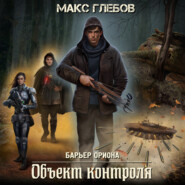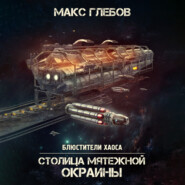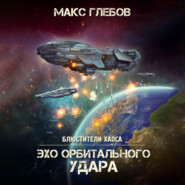По всем вопросам обращайтесь на: info@litportal.ru
(©) 2003-2024.
✖
Prohibition of Interference. Book 2. Tactical Level
Настройки чтения
Размер шрифта
Высота строк
Поля
“He said that Major General Ponedelin, commander of the 12th Army, was appointed commander of all the encircled forces, and that General Muzychenko was actually removed from the planning and organization of the operation to get out of the pocket.
However, according to him, General Muzychenko was given the task of ensuring the breakthrough of the 6th Army staff column to the Southern Front troops and to coordinate with them the efforts to hold the punctured corridor and the subsequent withdrawal of the remaining troops of the encircled armies from the pocket. There was no doubt in my mind that, to this end, the ‘special purpose convoy’ should concentrate the best of the equipment remaining in the line.”
The officer of the Special Department became gloomy. He pondered my words in silence for a while, and then said:
“That's enough for today, Comrade Nagulin. You will now put your testimony in writing, and you are free to go. Our conversation is not over yet, but we will continue it a little later.”
* * *
The special department of the NKVD of the Southern Front was located in Dnepropetrovsk. Battalion Commissar Kirillov did not take the risk of trusting the information he gathered to the telephone and went to his superiors in person. Comrade Sazykin's office was on the third floor of a pre-revolutionary building on Oktyabrskaya Square, where Kirillov arrived close to noon.
“Well, Battalion Commissar, any results?” The head of the Special Department came out from behind the desk and extended his hand to his subordinate.
“Yes, Comrade Commissioner of State Security 3rd Class,” Kirillov nodded, shaking Sazykin's hand, “but not exactly what we hoped for.”
“What have you dug up?”
“The testimony of Muzychenko and Sokolov is confirmed. Pfc. Nagulin, promoted to junior lieutenant by order of the commander of the 6th Army, states that his immediate superior Major Svirsky, while giving him a combat task, also told him the task of the entire 'special purpose convoy'. Why he did it, and how he himself got this information, remains unclear, and it is no longer possible to ask him, but Nagulin's words coincide with the testimony of the Lieutenant General and the Division Commander.”.
“Do you have the papers with you?”
“Yes, everything I collected is here,” Kirillov lightly slapped his palm on his leather briefcase.
“You leave them to me. An order came from Moscow. Muzychenko and Sokolov are being taken away from us. At 4 p.m. a plane will fly in to pick them up, so this case will now go to the top, to the Directorate, and our job is to pass on all the findings to the superiors.”
“Copy that!” Kirillov opened his briefcase and began to take out the cardboard folders, “What about the others who got out of the encirclement?”
“It's the same as usual,” Sazykin shrugged, “We'll interrogate them, and if we don't find any evidence of treason, we'll turn them over to the personnel service. We have divisions of 3,000 men each, so they'll find a place quickly.”
“Shall we send Nagulin to re-form too? Muzychenko, in his testimony, singled him out especially, and even wrote submissions for state awards on him and his men.”
“What rewards, battalion commissar? Two armies and a mech-corps perished in a pocket! Forget it. Let them be glad to be alive.”
“Comrade Commissioner of State Security 3rd Class, allow me to work with Nagulin more thoroughly. This is a very unusual fighter. Not everyone can personally shoot down several enemy planes. He speaks German without an accent. People who have been around him tell stories about his hearing and eyesight…”
“This is not our business, Comrade Kirillov. Do you have reason to suspect Nagulin of treason, criminal cowardice, or collaboration with the enemy?”
“There is no direct evidence, but…”
“I got acquainted with his case, battalion commissar – this case also interested me, but a fighter who personally destroyed so many fascists, can't work for the enemy. Iron evidence of these facts is not always present, but what was seen by dozens of Red Army soldiers and commanders, is more than enough.”
“What if he is not working for the Germans? There are still allies and neutral countries. In that case German losses can only be to his advantage. He is very well prepared. This is noted by Captain Shcheglov and Sergeant Ignatov. This is also confirmed by sniper Serova and Sergeant Pluzhnikov, who, let me remind you, is from our department. I'm not talking about the Red Army soldiers Chezhin and Sharkov, whose opinion could have been ignored, if it didn't coincide with the others. Where could he have received such training? In the taiga, shooting at squirrels? I don't believe it!”
“I thought about it,” nodded the head of the Special Department, “it doesn't add up. No one would ever infiltrate an agent with such training in such a crude way, the risk of losing a valuable specialist is too great. And do the Americans or the British really need an agent on the front lines of the Soviet-German front? The resource cost of preparing an operation of this level is incommensurate with the possible benefits.
All right, that's it! Send him to the personnel office, but don't take the surveillance off. For the time being, let those in charge handle it, and then we'll see. We let him prove himself not in a pocket, when there are almost no living witnesses to his tricks, but in a more controlled situation. The only thing is… whisper to them that Nagulin should be assigned to the same unit as the men in his platoon. We have already worked with them, and it is not yet necessary to expand the circle of people who know about our interest in him.”
“What about his rank?”
“And what about his rank? We have an order from the Commander of the 6th Army. The Front Commander Tyulenev did not cancel it. Muzychenko himself is not yet officially charged with anything, and with these testimonies,” Sazykin nodded at the folders on his desk, “most likely, he will not be charged with anything, he has honestly performed the task, so all the charges will go to General Ponedelin, who surrendered. So let Nagulin be the commander, since he deserves it, especially since his platoon performed at its best during the breakthrough. We can't reward him, so at least we'll keep the cube in his buttonhole. That's it, Battalion Commissar, you're free. I still need to prepare the Muzychenko and Sokolov cases for transfer to Moscow.”
* * *
The respite allowed me to take stock and evaluate my actions. I can't say that I was satisfied with them. Yes, I managed to escape from the pocket, and that is a definite plus, but, as practice has shown, I had all the chances of staying there, having caught an accidental bullet or shrapnel, or even just being captured. In the final part of the breakthrough I finally lost control of the situation, and if Muzychenko had not promptly organized a rocket and artillery strike against the motorized battalion that had clamped us, this story would not have ended well for me and my men.
As long as I'm operating on a tactical level, I'm not going to get anything useful done. An accurate marksman, exceptionally effective scout, or saboteur is fine, but it's only a captain's level, well, in the best-case scenario, the level of a major. This does not mean that there is no point in taking advantage of these benefits, but they're not the ones I need to focus on.
I have a network of satellites at my disposal, the potential of which is much greater than that I have already used. Due to circumstances, I could not fully dispose of extensive data on the course of military operations on the entire front, and was forced to confine myself to the limits of the Uman battlefield, and more often to a few kilometers around the place where I was at the moment. Now that I was out of the encirclement, I had some room for choice. Naturally, no one will ask the junior lieutenant where he wishes to apply his military leadership talents, but at least now the problem of basic survival is not taking up all my available time and energy, so I can think calmly about the situation.
First, about the satellite network itself. I use it as a local car driver, just recently getting behind the wheel. I more or less know what knobs to pull, what to twist and where to push, but I have no idea how it all works or how to adjust the engine and the hanger bracket to make it work better. That's understandable – I'm a space fighter pilot, not a scientist. Yes, I picked up something from Letra, but it's a pittance compared to what the experts who researched Earth's civilization knew. I had never even thought before about where the information that accompanies the satellite picture comes from.
I saw from orbit, say, a tank column crawling along the highway. Well, a column, then what? But the computer would immediately tell me, that they were, for example, vehicles of the 'Leibstandarte SS Adolf Hitler' tank division, and sometimes it would indicate the end point of their route. And the names of the unit commanders? I saw them in the comments too, but where did the computer get them from? There are no unit numbers and the names of commanders written on the equipment.
Of course, I understood that before I was on the planet, research had been going on for many years, and there was a lot of information accumulated in the databases, which could be processed by the computer to supplement the data from orbit, but some of the details just can't be figured out by observation from above. Undoubtedly, there is also radio interception, which the network of satellites conducts in continuous mode. Cracking local ciphers is easy, but even this does not explain everything, although it explains a lot.
Where, for example, does one get detailed information about the design of weapons and equipment? That Finnish pistol, for example… When I took this weapon apart, I had in front of me a three-dimensional model with all the details of its construction and functioning. From where? The answer suggests itself – there is something else besides satellites.
Colonel Niven didn't tell me anything about this, he just didn't have time, I guess, but Letra told me about drones equipped with camouflage field generators that are used to collect data on other planets. She did not mention that these drones are also used on Earth, but if scientists from other research bases had used them to obtain information, why not assume that the drones are here, too, and they are still operating even now, sending the collected data into orbit? That's quite likely. The other thing is that I don't know how to operate them, and maybe I don't have the right access codes.
The computer had the satellite network documentation in its memory, but I did not have time to study it, which is not surprising. Letra, for example, studied at Metropolis for four years before taking her position, and, according to her story, not all of those who began the training were able to finish it. I know how to make the most necessary settings, but beyond that… In general, it seems that the most complete mastering of the high-tech tool I have got in my hands should be one of my main tasks for the near future, if my knowledge and training are sufficient.
Chapter 2
A cozy courtyard with neat benches, which were surrounded by carefully trimmed green bushes, was visible from the window of a military hospital room in Dresden. Erich von Schliemann had had enough of this view, and when the massive gates opened and let a black Mercedes into the courtyard, he was even a little pleased with something new in the boredom of recent days. A few minutes later, footsteps were heard outside the door, and Colonel Heinrich Richtengden followed the doctor into the room, wearing a white coat over his uniform.
The Major rose to meet him. It had been relatively easy for him the last few days.
“It's good to see you, Erich,” said the Colonel without a smile, “I was afraid it was much worse.”
“Herr Oberst,” the doctor said to the guest, “Major Schliemann suffered a serious concussion. Please try not to make him nervous.”
“I'll take that into account,” the Colonel nodded, and the doctor quietly left, closing the door behind him.
“How do you feel, Erich?”
“You're absolutely right, it could be worse,” the Major shrugged, “You know, Heinrich, I had no idea that the Communists could act so quickly. That barrage of fire… My battalion was wiped out.”
“Russian rocket artillery,” the Colonel winced, “So far they don't have many of these weapons, but it looks like the enemy command is banking on them. Our Nebelwerfers are more accurate, but the Bolsheviks have a longer range and more shells in a volley. It's not a pleasant thing.”
“I've had the opportunity to see it for myself,” Schliemann nodded.
“What happened there, Erich? The testimony of the survivors doesn't make the picture very clear. Did the Russian marksman manage to get away?”
“Most likely yes, Herr Oberst. Unless, of course, he was caught by accidental shrapnel. I ordered my men not to shoot him – I wanted to take him alive, but the Russians hit with such force that anything could have happened.”
“This is bad, Erich. Very bad. I think you should understand the depth of the trouble that awaits us in the near future. Our operation was already known at the top, and now, if the Russians put their new firing equipment into production…”
“It's not so terrible, Heinrich,” Schliemann said with a slight smile on his face.
However, according to him, General Muzychenko was given the task of ensuring the breakthrough of the 6th Army staff column to the Southern Front troops and to coordinate with them the efforts to hold the punctured corridor and the subsequent withdrawal of the remaining troops of the encircled armies from the pocket. There was no doubt in my mind that, to this end, the ‘special purpose convoy’ should concentrate the best of the equipment remaining in the line.”
The officer of the Special Department became gloomy. He pondered my words in silence for a while, and then said:
“That's enough for today, Comrade Nagulin. You will now put your testimony in writing, and you are free to go. Our conversation is not over yet, but we will continue it a little later.”
* * *
The special department of the NKVD of the Southern Front was located in Dnepropetrovsk. Battalion Commissar Kirillov did not take the risk of trusting the information he gathered to the telephone and went to his superiors in person. Comrade Sazykin's office was on the third floor of a pre-revolutionary building on Oktyabrskaya Square, where Kirillov arrived close to noon.
“Well, Battalion Commissar, any results?” The head of the Special Department came out from behind the desk and extended his hand to his subordinate.
“Yes, Comrade Commissioner of State Security 3rd Class,” Kirillov nodded, shaking Sazykin's hand, “but not exactly what we hoped for.”
“What have you dug up?”
“The testimony of Muzychenko and Sokolov is confirmed. Pfc. Nagulin, promoted to junior lieutenant by order of the commander of the 6th Army, states that his immediate superior Major Svirsky, while giving him a combat task, also told him the task of the entire 'special purpose convoy'. Why he did it, and how he himself got this information, remains unclear, and it is no longer possible to ask him, but Nagulin's words coincide with the testimony of the Lieutenant General and the Division Commander.”.
“Do you have the papers with you?”
“Yes, everything I collected is here,” Kirillov lightly slapped his palm on his leather briefcase.
“You leave them to me. An order came from Moscow. Muzychenko and Sokolov are being taken away from us. At 4 p.m. a plane will fly in to pick them up, so this case will now go to the top, to the Directorate, and our job is to pass on all the findings to the superiors.”
“Copy that!” Kirillov opened his briefcase and began to take out the cardboard folders, “What about the others who got out of the encirclement?”
“It's the same as usual,” Sazykin shrugged, “We'll interrogate them, and if we don't find any evidence of treason, we'll turn them over to the personnel service. We have divisions of 3,000 men each, so they'll find a place quickly.”
“Shall we send Nagulin to re-form too? Muzychenko, in his testimony, singled him out especially, and even wrote submissions for state awards on him and his men.”
“What rewards, battalion commissar? Two armies and a mech-corps perished in a pocket! Forget it. Let them be glad to be alive.”
“Comrade Commissioner of State Security 3rd Class, allow me to work with Nagulin more thoroughly. This is a very unusual fighter. Not everyone can personally shoot down several enemy planes. He speaks German without an accent. People who have been around him tell stories about his hearing and eyesight…”
“This is not our business, Comrade Kirillov. Do you have reason to suspect Nagulin of treason, criminal cowardice, or collaboration with the enemy?”
“There is no direct evidence, but…”
“I got acquainted with his case, battalion commissar – this case also interested me, but a fighter who personally destroyed so many fascists, can't work for the enemy. Iron evidence of these facts is not always present, but what was seen by dozens of Red Army soldiers and commanders, is more than enough.”
“What if he is not working for the Germans? There are still allies and neutral countries. In that case German losses can only be to his advantage. He is very well prepared. This is noted by Captain Shcheglov and Sergeant Ignatov. This is also confirmed by sniper Serova and Sergeant Pluzhnikov, who, let me remind you, is from our department. I'm not talking about the Red Army soldiers Chezhin and Sharkov, whose opinion could have been ignored, if it didn't coincide with the others. Where could he have received such training? In the taiga, shooting at squirrels? I don't believe it!”
“I thought about it,” nodded the head of the Special Department, “it doesn't add up. No one would ever infiltrate an agent with such training in such a crude way, the risk of losing a valuable specialist is too great. And do the Americans or the British really need an agent on the front lines of the Soviet-German front? The resource cost of preparing an operation of this level is incommensurate with the possible benefits.
All right, that's it! Send him to the personnel office, but don't take the surveillance off. For the time being, let those in charge handle it, and then we'll see. We let him prove himself not in a pocket, when there are almost no living witnesses to his tricks, but in a more controlled situation. The only thing is… whisper to them that Nagulin should be assigned to the same unit as the men in his platoon. We have already worked with them, and it is not yet necessary to expand the circle of people who know about our interest in him.”
“What about his rank?”
“And what about his rank? We have an order from the Commander of the 6th Army. The Front Commander Tyulenev did not cancel it. Muzychenko himself is not yet officially charged with anything, and with these testimonies,” Sazykin nodded at the folders on his desk, “most likely, he will not be charged with anything, he has honestly performed the task, so all the charges will go to General Ponedelin, who surrendered. So let Nagulin be the commander, since he deserves it, especially since his platoon performed at its best during the breakthrough. We can't reward him, so at least we'll keep the cube in his buttonhole. That's it, Battalion Commissar, you're free. I still need to prepare the Muzychenko and Sokolov cases for transfer to Moscow.”
* * *
The respite allowed me to take stock and evaluate my actions. I can't say that I was satisfied with them. Yes, I managed to escape from the pocket, and that is a definite plus, but, as practice has shown, I had all the chances of staying there, having caught an accidental bullet or shrapnel, or even just being captured. In the final part of the breakthrough I finally lost control of the situation, and if Muzychenko had not promptly organized a rocket and artillery strike against the motorized battalion that had clamped us, this story would not have ended well for me and my men.
As long as I'm operating on a tactical level, I'm not going to get anything useful done. An accurate marksman, exceptionally effective scout, or saboteur is fine, but it's only a captain's level, well, in the best-case scenario, the level of a major. This does not mean that there is no point in taking advantage of these benefits, but they're not the ones I need to focus on.
I have a network of satellites at my disposal, the potential of which is much greater than that I have already used. Due to circumstances, I could not fully dispose of extensive data on the course of military operations on the entire front, and was forced to confine myself to the limits of the Uman battlefield, and more often to a few kilometers around the place where I was at the moment. Now that I was out of the encirclement, I had some room for choice. Naturally, no one will ask the junior lieutenant where he wishes to apply his military leadership talents, but at least now the problem of basic survival is not taking up all my available time and energy, so I can think calmly about the situation.
First, about the satellite network itself. I use it as a local car driver, just recently getting behind the wheel. I more or less know what knobs to pull, what to twist and where to push, but I have no idea how it all works or how to adjust the engine and the hanger bracket to make it work better. That's understandable – I'm a space fighter pilot, not a scientist. Yes, I picked up something from Letra, but it's a pittance compared to what the experts who researched Earth's civilization knew. I had never even thought before about where the information that accompanies the satellite picture comes from.
I saw from orbit, say, a tank column crawling along the highway. Well, a column, then what? But the computer would immediately tell me, that they were, for example, vehicles of the 'Leibstandarte SS Adolf Hitler' tank division, and sometimes it would indicate the end point of their route. And the names of the unit commanders? I saw them in the comments too, but where did the computer get them from? There are no unit numbers and the names of commanders written on the equipment.
Of course, I understood that before I was on the planet, research had been going on for many years, and there was a lot of information accumulated in the databases, which could be processed by the computer to supplement the data from orbit, but some of the details just can't be figured out by observation from above. Undoubtedly, there is also radio interception, which the network of satellites conducts in continuous mode. Cracking local ciphers is easy, but even this does not explain everything, although it explains a lot.
Where, for example, does one get detailed information about the design of weapons and equipment? That Finnish pistol, for example… When I took this weapon apart, I had in front of me a three-dimensional model with all the details of its construction and functioning. From where? The answer suggests itself – there is something else besides satellites.
Colonel Niven didn't tell me anything about this, he just didn't have time, I guess, but Letra told me about drones equipped with camouflage field generators that are used to collect data on other planets. She did not mention that these drones are also used on Earth, but if scientists from other research bases had used them to obtain information, why not assume that the drones are here, too, and they are still operating even now, sending the collected data into orbit? That's quite likely. The other thing is that I don't know how to operate them, and maybe I don't have the right access codes.
The computer had the satellite network documentation in its memory, but I did not have time to study it, which is not surprising. Letra, for example, studied at Metropolis for four years before taking her position, and, according to her story, not all of those who began the training were able to finish it. I know how to make the most necessary settings, but beyond that… In general, it seems that the most complete mastering of the high-tech tool I have got in my hands should be one of my main tasks for the near future, if my knowledge and training are sufficient.
Chapter 2
A cozy courtyard with neat benches, which were surrounded by carefully trimmed green bushes, was visible from the window of a military hospital room in Dresden. Erich von Schliemann had had enough of this view, and when the massive gates opened and let a black Mercedes into the courtyard, he was even a little pleased with something new in the boredom of recent days. A few minutes later, footsteps were heard outside the door, and Colonel Heinrich Richtengden followed the doctor into the room, wearing a white coat over his uniform.
The Major rose to meet him. It had been relatively easy for him the last few days.
“It's good to see you, Erich,” said the Colonel without a smile, “I was afraid it was much worse.”
“Herr Oberst,” the doctor said to the guest, “Major Schliemann suffered a serious concussion. Please try not to make him nervous.”
“I'll take that into account,” the Colonel nodded, and the doctor quietly left, closing the door behind him.
“How do you feel, Erich?”
“You're absolutely right, it could be worse,” the Major shrugged, “You know, Heinrich, I had no idea that the Communists could act so quickly. That barrage of fire… My battalion was wiped out.”
“Russian rocket artillery,” the Colonel winced, “So far they don't have many of these weapons, but it looks like the enemy command is banking on them. Our Nebelwerfers are more accurate, but the Bolsheviks have a longer range and more shells in a volley. It's not a pleasant thing.”
“I've had the opportunity to see it for myself,” Schliemann nodded.
“What happened there, Erich? The testimony of the survivors doesn't make the picture very clear. Did the Russian marksman manage to get away?”
“Most likely yes, Herr Oberst. Unless, of course, he was caught by accidental shrapnel. I ordered my men not to shoot him – I wanted to take him alive, but the Russians hit with such force that anything could have happened.”
“This is bad, Erich. Very bad. I think you should understand the depth of the trouble that awaits us in the near future. Our operation was already known at the top, and now, if the Russians put their new firing equipment into production…”
“It's not so terrible, Heinrich,” Schliemann said with a slight smile on his face.





